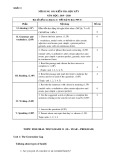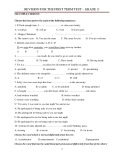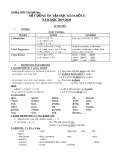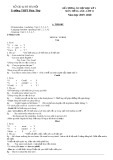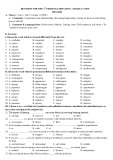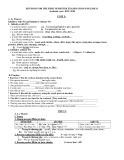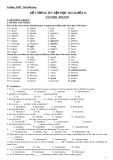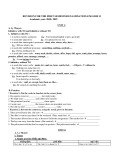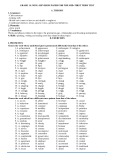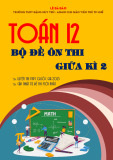
FOR 11TH GRADE STUDENTS 2019
TOPIC 1:FRIENDSHIP
A.VOCABULARY:
1. unselfishness [,ʌn'selfi∫nis] (n) tính
không ích kỹ
2. unselfish [,ʌn'selfi∫] (a)
3. constancy ['kɔnstənsi](n) sự bền lòng
4. loyalty ['lɔiəlti](n) lòng trung thành
5. trust [trʌst] (n) lòng tin, sự tin cậy
6. sympathy['simpəθi](n) sự thông cảm
7. acquaintance[ə'kweintəns](n) quen biết
8. mutual ['mju:tjuəl] (a) lẫn nhau, chung
9. suspicion[sə'spi∫n](n) sự nghi ngờ
10. give- and- take (n) quan hệ cho và nhận
11. incapable of [in'keipəbl](a) không thể
12. medium ['mi:diəm] (a) trung bình, vừa
13. oval ['ouvəl] (a) trái xoan
14. crooked ['krukid] (a) quập, cong
15. hospitable ['hɔspitəbl] (a) hiếu khách
16. generous ['dʒenərəs] (a) hào phóng
17. modest ['mɔdist] (a) khiêm tốn
18. honest ['ɔnist] (a) thật thà, hiền lành
19. humorous ['hju:mərəs](a) hài hước
20. sense of humour (exp) tính hài hước
21. studious ['stju:diəs] (a) chăm chỉ
22. apartment buiding (exp) chung cư
23. favourite ['feivərit](a) được ưa thích
B. GRAMMAR:INFINITIVES
1. Infinitive with to (động từ nguyên mẫu có “to”) Sau một số động từ dưới đây:
1. would like / would love / want : muốn
2. be able / enable : có thể
3. hope : hy vọng
4. wish : ao ước
4. decide : quyết định
6. hesitate: do dự
7. intend : dự định
8. refuse: từ chối
9. seem: dường như
10. become : trở thành
11. agree/ disagree : đồng ý/ không đồng
ý
12. appear: có vẻ như, xuất hiện
13. fail: thất bại
14. threaten: đe dọa
15. afford: có khả năng
16. plan: vạch kế hoạch
17. manage: xoay sở
18. arrange: sắp xếp
19. promise: hứa
20. attempt: cố gắng
21. tend: có xu hướng
22. learn: học
23. offer: cho
24. ask: hỏi, yêu cầu
25. order: ra lệnh
26. invite: mời
27.warn: cảnh báo
- Hoặc theo sau các cấu trúc như ví dụ dưới đây:Sau các từ nghi vấn: what, how, where, when,
whether… Eg. The teacher explained how to use the computer.
- Sau cấu trúc: It’s + adj + to VEg. It is fun to go to the cinema
2. Infinitive without to(động từ nguyên mẫu không “to”) Trong các trường hợp sau:
- Sau khiếm khuyết động từ (can, could, may, might, will, would, shall, should, must ...)
Ex. She can speak English very well
- Sau động từ: make, let, see, watch, hear, feel, notice,…Ex. He saw them arrive home late.
TOPIC2:PERSONAL EXPERIENCES
A. VOCABULARY:
1. glance at [glɑ:ns] (v) liếc
2. make a fuss (exp) làm ầm ĩ
3. embarrassing [im'bærəsiη] (adj)
ngượng
4. idol ['aidl] (n) thần tượng
5. sneaky ['sni:ki] (adj) lén lút
6. experience [iks'piəriəns] (n) kinh
nghiệm
7. affect [ə'fekt] (v) làm ảnh hưởng
8. travel ['trævl] (v) đi du lịch
9. fail an exam (v) thi rớt
10. appreciate [ə'pri:∫ieit] (v) đánh giá cao
14. cottage ['kɔtidʒ] (n) nhà tranh
15. embrace [im'breis](v) ôm
16. escape [is'keip](v) thoát khỏi
17. memorable ['memərəbl](a)đáng nhớ
18. scream [skri:m](v) la hét
19. protect [prə'tekt](v) bảo vệ
20. rescue ['reskju:](v) cứu nguy, cứu hộ
21. appreciate [ə'pri:∫ieit](v) trân trọng
22. imitate ['imiteit](v) bắt chước
23. turn away (v) quay đi, bỏ đi
24. wad [wɔd](n) nắm tiền
25. set off (v) lên đường

FOR 11TH GRADE STUDENTS 2019
11. serious ['siəriəs] (n) nghiêm trọng
12. attitude ['ætitju:d] (n) thái độ
13. imagine [i'mædʒin] (v) tưởng tượng
B. GRAMMAR: TENSES
I. The present tenses: Các thì hiện tại
1. The simple present tense: Thì hiện tại thường
1.1. The form: Công thức cấu tạo
( + ) S - V ( - ) S - don’t/ doesn’t – V ( ? ) Do/ Does - S - V?
1.2. The usage: Trường hợp sử dụng
- To denote actions that happened repeatedly. Diễn tả những hành động được lặp đi lặp lại,thường
đi với các trạng từ chỉ tần suất như: always, usually, often, sometimes, etc.
e.g. She never comes late. They walk to school every day.
- To denote long lasting events. Diễn tả hành động tồn tại lâu dài như một điều tất yếu.
e.g. We live in Concord street. He works for a factory near his house.
- To denote a true fact. Diễn tả những sự thật hiển nhiên.
e.g. The earth moves around the Sun.The Sun rises in the east.
1.3. The recognition: Các dấu hiệu nhận biết của thì này là các trạng từ chỉ thời gianvà tần suất
như sau:- now/ nowadays/ today/ this summer/… - always/ usually/ often/ sometimes/ occasionally/
… - the proof of constant truth.
1.4. Notes: Chú ý
- To denote a plan/ prediction/ timetables/… Thì Hiện tại thường còn dùng để diễn tả một kế hoạch,
dự đoán,hay thời gian biểu như:
e.g. A: When does the first train leave? B: It leaves at 9.00.
- The division of “be”, “have”, “can, may, must”,…
2. The present progressive tense: Thì hiện tại tiếp diễn
2.1. The form: Công thức cấu tạo
( + ) S - am/ are/ is - V-ING
( - ) S - am/ are/ is - not - V-
ING
( ? ) Am/ Are/ Is - S - V-ING?
2.2. The usage: Cách sử dụng
- To denote happening actions at the time of speaking. Diễn tả những hành động đang diễn ra tại
thời điểm nói, thường đi với các trạng từ: now, right now, at the moment, at this time, etc.
e.g. She is teaching Maths now. He is watching a football match at the moment.
- To denote the interruption/ intention/ prediction/ plan/… Diễn tả những dự kiến,
e.g. She is coming soon. (In fact, she has not come yet). Be quiet! The baby is sleeping.
2.3. The recognition: Dấu hiệu nhận biết của thì này căn cứ vào các trạng từ sau:
- now/ right now/ at present/ at this time/ at this moment/…
e.g. Right now, they are working in the factory.
- follow a command, request,… e.g. Be quiet! I am trying to listen to the news.
2.4. Notes: Điểm cần lưu ý
- The ING-forms – Gấp đôi phụ âm cuối khi tạo present participles với các động từ sau: getting,
running, having, writing, dying, lying,…)
e.g. She is running in the park now.
- The omission of the verbs of awareness or sensation as - một số động từ không dùng cho thì hiện
tại tiếp diễn như: be/ see/ hear/ understand/ know/ like/ want/ glance/ feel/ think/ smell/ love/ hate/
realize/ seem/ remember/ forget/…(use the simple present instead - mà thay vào đó ta dùng thì hiện
tại thường để diễn tả).
3. The present perfect tense: Thì hiện tại hoàn thành
3.1. The form: Công thức cấu tạo

FOR 11TH GRADE STUDENTS 2019
( + ) S - have/ has - P.P ( - ) S - haven’t/ hasn’t - P.P ( ? ) Have/ Has - S - P.P?
3.2. The usage: Cách sử dụng
- Actions that happened in the past but having results, relating, or still happening at present.
e.g. We have lived here since 1990. They have learned English for 5 years.
- To denote actions that happened right before the time of speaking, using “just”.
e.g. She has just come from New York. They have just bought a new house.
- To denote unfulfilled actions with “yet”.
e.g. He hasn’t come yet. Have you met him yet?
- To denote past actions; no certain time expression, using “already”.
e.g. We have already seen that film. She has already been to Paris.
3.3. The recognition:
- just/ recently/ lately. - ever/ never (comments) e.g. We haven’t gone to the theatre recently.
- already/ yet/ since/ for/ so far/ until now/ up to now (present).
e.g. He has written ten books so far.
3.4. Notes: - Past participles: (regular verbs adding “ed”./ irregular verbs “learn by heart”)
- The differences between the present perfect and the simple past tense.
4. The present perfect progressive tense: Thì hiện tại hoàn thành tiếp diễn
4.1. The form: Công thức cấu tạo
( + ) S - had - been - V-ing ( - ) S - had not (hadn’t) - been - V-ing ( ? ) Had - S - been - V-ing?
4.2. The usage: Cách sử dụng
- Actions that happened in the past but having results, relating, or still happening at present.
e.g. We have been living here since 1990.They have been learning English for 6 years now.
4.3. The recognition: Dấu hiệu nhận biết since/ for/ with verbs as: live, work, wait,…
e.g. She has been waiting for 6 hours now.They have been playing since 3 o’clock.
II. The past tenses: các thì quá khứ
1. The simple past tense: Thì quá khứ đơn
1.1. The form: Công thức cấu tạo (p.V = the past form of verbs)
( +) S – p.V ( - ) S - didn’t – V ( ? ) Did - S - V?
1.2. The usage: Cách sử dụng
- To denote a finished past action.
e.g. We went to the park together. He gave her mother a ten-dollar note.
- To report past events, past habits, or long lasting action in the past.
e.g. She did all the work yesterday. We used to sit next to each other.
1.3. The recognition: Dấu hiệu nhận biết
- last week/ month/ year/… e.g. He had 5 bad marks last month. They got married last year.
- yesterday/ ago/ in 1969/ in the past/…
e.g. Long long ago, there lived a couple by the sea.Man first discovered AIDS in 1981.
1.4. Notes: Những điểm cần lưu ý
- The past form of the verbs: (regular “V-ED”/ irregular (2nd column in the irregular verbs list))
- “ED” pronunciation /id/; /t/; /d/.
2. The past progressive tense: Thì quá khứ tiếp diễn
2.1. The form: Công thức cấu tạo
( + ) S - was/ were - V-ING ( - ) S - was/ were - not - V-ING ( ? ) Was/ Were - S - V-ING?

FOR 11TH GRADE STUDENTS 2019
2.2. The usage: Cách sử dụng- To denote past happening actions.
e.g. She was watching T.V at 8.00 last night. Ann was walking to school at 6.00 yesterday.
- To denote past interrupting actions.
e.g. She was watching T.V when I came. While he was playing on the swing, it started to rain.
2.3. The recognition: Dấu hiệu nhận biết
- at 8.00 last night/ at that time/ at that moment/…
e.g. At 3.00 yesterday, the Jones were driving home. He was sleeping at that time.
- time clause with “when”, “while = as”.
e.g. As I was walking home, a stranger stopped me to ask for help.
2.4. Notes: Những điểm cần lưu ý actions that alternatively happened, use the simple past only.
e.g. When I heard a knock at the door, I came to open it. When I opened the door, I saw my mum.)
3. The past perfect tense: Thì quá khứ hoàn thành
3.1. The form: Công thức cấu tạo
( + ) S - had - P.P (P2) ( - ) S - had not (hadn’t) - P.P (P2) ( ? ) Had - S - P.P (P2)?
3.2. The usage: Cách sử dụngTo denote past finished actions that happened and finished before a
certain point of time or another past event (the past of the past tense).
e.g: She had sold all the baskets before 9.00 yesterday.
3.3. The recognition: Dấu hiệu nhận biết- when-clause/ after/ before/ already/ since/ for/…
e.g. Before he left for home, he had turned all the lights off.
- The past perfect progressive “S + had been + V-ING”
4. The past perfect progressive tense: Thì quá khứ hoàn thành tiếp diễn
4.1. The form: Công thức cấu tạo
( + ) S - had - been - V-ing
( - ) S - had not (hadn’t) - been - V-
ing
( ? ) Had - S - been - V-ing?
4.2. The usage: Cách sử dụngTo denote past finished actions that happened and finished before a
certain point of time or another past event (the past of the past tense).
e.g: She had been waiting for us since 9.00 yesterday.
4.3. The recognition: Dấu hiệu nhận biết
- when-clause/ after/ before/ already/ since/ for/…
e.g. After he had been waiting for a while, he felt annoyed.
- The past perfect progressive “S - had been - V-ING”
III. The future tenses: các thì tương lai
1. The simple future tense: thì tương lai thường
1.1. The form: Công thức cấu tạo
( + ) S - will/ shall - V ( - ) S + will/ shall – V ( ? ) Will/ Shall - S - V?
- “shall” is restrictedly used only for I/We with the formal senses.
- The negative forms “will not = won’t”, “shall not = shan’t”.
1.2. The usage: Cách sử dụng- To denote future actions.
e.g. They will build more hospitals. We shall go to your party.
- To denote future plan/ idea/ timetable/…
e.g. The car will start in-time. We shall finish the course in June.
1.3. The recognition: Dấu hiệu nhận biết
- someday, tomorrow,…/ e.g. She will be rich someday.
- next week/ month/ year/.. e.g. He won’t leave next month.
1.4. Notes: Điểm cần lưu ý “shan’t” is not used in conditional sentences./ “ shall” is used as a
suggestion/ invitation/…. e.g. A: Shall we meet tonight?B: Yes, let’s.
2. The future progressive tense: thì tương lai tiếp diễn

FOR 11TH GRADE STUDENTS 2019
2.1. The form: Công thức cấu tạo
( + ) S - will be - V-ING ( - ) S - won’t be - V-ING ( ? ) Will - S - be - V-ING?
2.2. The usage: Cách sử dụng- To denote timetables/ intentions/ plans/… using “at”.
e.g: She will be watching T.V at 8.00 tonight.
We will be staying at REX hotel at 5.00 next Sunday’s morning.
- To show the future happening actions with “when”.
e.g. She will be sitting at the gate when we come tomorrow.
3. The future perfect tense: thì tương lai hoàn thành
3.1. The form: Công thức cấu tạo
( + ) S - will have - P.P (P2) ( - ) S - won’t have - P.P (P2) ( ? ) Will - S + have - P.P?
3.2. The usage: Cách sử dụng- To denote planned actions with “by”, “by the time”, “by then”.
e.g: She will have finished the course by the next Friday/ by then.
- To show a future schedule-finished action.
e.g: The bridge will have been used by the next Autumn.
3.3. Other forms: Các hình thức diễn đạt tương lai khác
a. The simple present tense: To denote a timetable, or a plan…Thì hiện tại thường diễn tả kế
hoạch,dựđịnh, thời gian biểu,…
e.g: A: When does he leave? B: He leaves tonight. (He doesn’t leave in fact)
b. The present progressive: To denote an intention. Thì hiện tại tiếp diễn có cách
diễn đạt tương lai tương tự thì hiện tai thường, nhưng có tinha chắc chắn cao hơn.
e.g: A: When are you leaving? B: I am leaving this afternoon.
c. The “be + going to inf” form: To denote an intention/ a near future action, an arrangement.
e.g: She is going to celebrate her 34th birthday. They are going to get married.
IV. The sequences of tenses: Sự hòa hợp của các thì trong các mệnh đề.
1. Subordinate clauses: Mệnh đề phụ cơ bản
Main clause Subordinate clause
Simple present
tense.
simple present tense. /present perfect tense.
present progressive tense./ simple future tense.
“be going to V” form.
simple past tense (certain point of past time).
Simple past tense
simple past tense./ past progressive tense.
past perfect tense./ “would + V” form.
“be going to + V” past form.
simple present tense (showing the truth).
Present perfect
tense
Simple present tense.
Past perfect tense Simple past tense.
2. Adverbial clauses: Mệnh đề trạng ngữ
Main clause Adverbial clauses (of time)

